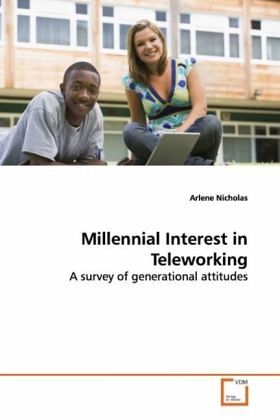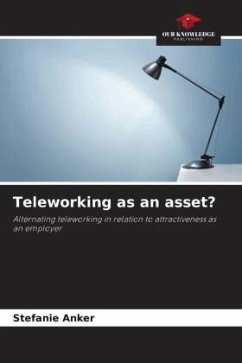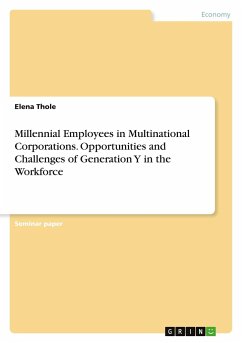
Millennial Interest in Teleworking
A survey of generational attitudes
Versandkostenfrei!
Versandfertig in 6-10 Tagen
52,99 €
inkl. MwSt.

PAYBACK Punkte
26 °P sammeln!
The telework option has been noted by researchers as a way to save costs and increase productivity for organizations; allow flexibility, savings, and relieve stress for employees; and be environmentally friendly for society. This study looks at the Millennials (born 1981- 1999)attitudes toward autonomy, work/life balance, perceived computer competence and its relationship with telework preference. Using a survey instrument, a sample of Millennials and non-Millennials (GenXers, Baby Boomers and Traditionalists) were scrutinized to determine their preferences by group. A sample of 263 university...
The telework option has been noted by researchers as
a way to save costs and increase productivity for
organizations; allow flexibility, savings, and
relieve stress for employees; and be environmentally
friendly for society. This study looks at the
Millennials (born 1981- 1999)attitudes toward
autonomy, work/life balance, perceived computer
competence and its relationship with telework
preference.
Using a survey instrument, a sample of Millennials
and non-Millennials (GenXers, Baby Boomers and
Traditionalists) were scrutinized to determine their
preferences by group. A sample of 263 university
students, faculty and staff represented 195
Millennials and 68 non-Millennials. Partial support
was found for the effect of autonomy and work/life
balance toward the preference to telework. Based on
the results, Millennials do not seem to prefer
teleworking. However, the analysis of differences
between males and females depicted greater interest
in males.
a way to save costs and increase productivity for
organizations; allow flexibility, savings, and
relieve stress for employees; and be environmentally
friendly for society. This study looks at the
Millennials (born 1981- 1999)attitudes toward
autonomy, work/life balance, perceived computer
competence and its relationship with telework
preference.
Using a survey instrument, a sample of Millennials
and non-Millennials (GenXers, Baby Boomers and
Traditionalists) were scrutinized to determine their
preferences by group. A sample of 263 university
students, faculty and staff represented 195
Millennials and 68 non-Millennials. Partial support
was found for the effect of autonomy and work/life
balance toward the preference to telework. Based on
the results, Millennials do not seem to prefer
teleworking. However, the analysis of differences
between males and females depicted greater interest
in males.












